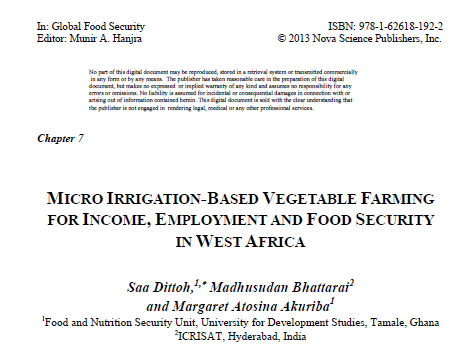micro irrigation based vegetable farming for income, employment and food security in west africa
Dry season smallholder irrigated vegetable production in the arid and semi-arid parts of the West African sub-region has been an important income generating activity and a means of engaging productive labour for many decades. Crop production has often been on less than half an acre per irrigator due to several constraints including low water table in the case of shallow well irrigators; poorly constructed dams, silting rivers and streams and water lifting constraints in the case of surface water irrigators; and limited market opportunities, among others. The resultant output per person, and thus income generated per worker, has been very low with high risks of unsustainable production. Attempts at “modern” irrigation systems in the sub-region have been largely unsuccessful but some of the micro irrigation systems operated by smallholders seem to be performing satisfactorily. That is an indication that “affordable micro-irrigation for vegetables” (AMIV) systems could be the answer for improving irrigated vegetable production in West Africa. This chapter examines the current issues of irrigated agriculture in the West African sub-region with particular reference to the potential of irrigation for income generation, employment and food security and suggests possible “growth paths” for irrigated vegetable production. It draws attention to the agribusiness potential that exists for all actors along the irrigated vegetable value chain. The paper is based on a comprehensive literature review of smallholder irrigation in several West African countries, particularly Nigeria and the Sahel countries, as well as a participatory rural appraisal field surveys in Burkina Faso, Ghana, Mali, Niger and Senegal. The paper argues for concerted effort by the governments and the private sector (smallholder irrigators and agribusiness concerns) of countries in the dry areas of West Africa to systematically develop micro irrigation systems identified by this and other studies. There is great potential for their use to increase the incomes of smallholder farmers, including women and the employment of the youth in rural and urban areas. They are also important in ensuring food and nutrition security in both rural and urban areas in the West African sub-region.
